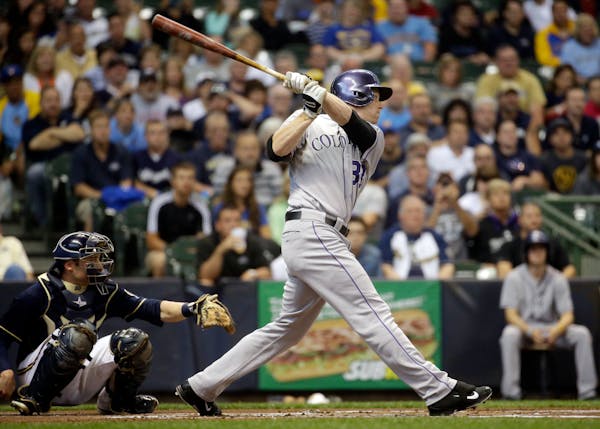Rod Carew remembers feeling so nervous that he barely could control his legs before his first All-Star Game as a 21-year-old Twins rookie in 1967.
The game was played in Anaheim, Calif., but for Carew, it felt like fantasyland because he got to meet and spend time with his two idols, Hank Aaron and Willie Mays.
Carew started at second base and batted second in the lineup, but all he kept thinking was, is this really happening?
"Just wake me up because I'm dreaming," he said.
That was the first of his 18 consecutive All-Star Game appearances — fifth most in Major League Baseball history. As the Twin Cities prepares to host the annual event, Carew stands as the perfect ambassador for the Twins, having worn their uniform in the All-Star Game in all 12 of his seasons with the organization.
The first one, he said, still ranks above the rest in his memories.
"I wasn't expected to do well my first year and all of a sudden I'm starting at second base in the All-Star Game," Carew said. "And to be out there and watching all those greats. Here I am, a kid, thinking about this and wondering, 'What are you doing here?' "
Carew became a fixture in the All-Star Game as he developed into a Hall of Fame player and one of the greatest hitters in major league history. Only Aaron (21 seasons), Mays (20), Stan Musial (20) and Cal Ripken Jr. (19) made an All-Star team more times than Carew.
"Well, the other guys played longer than me," Carew said, laughing.
The only season Carew didn't make the All-Star Game came in 1985, his final season. Ironically, that game was held in Minneapolis at the Metrodome.
Injuries forced Carew to miss three All-Star Games: 1970, '79 and '82. In his 15 appearances — all as a starter — he batted .244 with two RBI and eight runs scored. He also stole three bases.
To appreciate the longevity of his success, consider: His first All-Star at-bat came against Juan Marichal in '67. He faced Fernando Valenzuela in his final All-Star plate appearance in 1984. That's two generations of pitchers.
That's why the All-Star Game, even in his 18th trip, never became routine, Carew said.
"Because you never know when you're going to make another one," he said. "Every one that you make, you go and enjoy it and appreciate that fans take the time to vote for you."
Carew experienced his share of highlights along the way. In the 1978 game, he hit triples in his first two at-bats. He heard National League third baseman Pete Rose yelling something as he slid into third on the second one.
"After I got up, I said, 'What's up Pete,' " Carew recalled. "He said, 'Nobody's ever hit two triples in an All-Star Game. You're the only one.' "
Carew faced a few future Hall of Fame pitchers in his All-Star appearances, including Marichal, Don Drysdale, Bob Gibson, Don Sutton and Steve Carlton. He put Carlton at the top of list.
"I would say Steve Carlton because Lefty was nasty," he said. "Facing him from the left side, yeah, he was nasty. Wow."
Ahead of Gibson?
"Gibby was just downright mean," Carew said. "That's why he had so much success. He didn't believe in being friendly. As a player, you can appreciate that."
In 1980, Carew stole second base on future Hall of Fame catcher Johnny Bench — one of the best defensive catchers ever — with flame-thrower J.R. Richard on the mound.
"It's all about getting the jump," Carew said. "You don't have to be fast. I tell kids [to] watch pitchers, watch catchers. They both have weaknesses. If you can exploit those weaknesses, you can get away with it."
Beyond his personal memories, Carew remembers how serious his peers treated the All-Star Game back then. Nobody, he said, viewed that game as an exhibition.
"It wasn't about winning to get home-field advantage [for the World Series]," he said. "It was about winning to kick the National League's fanny. We had meetings before the All-Star Game. The president of the American League [said], 'Let's go, we've got to beat those guys. That's why we're here.' It was a game that we wanted to win."
Perez homers as KC beats Blue Jays 2-1 in game called after 5 innings, 3 1/2-hour rain delay
Elias Díaz gets key hit as the Rockies rally for a wild 10-9 victory over the Padres
Live: Vikings first-round draft updates, news and analysis

